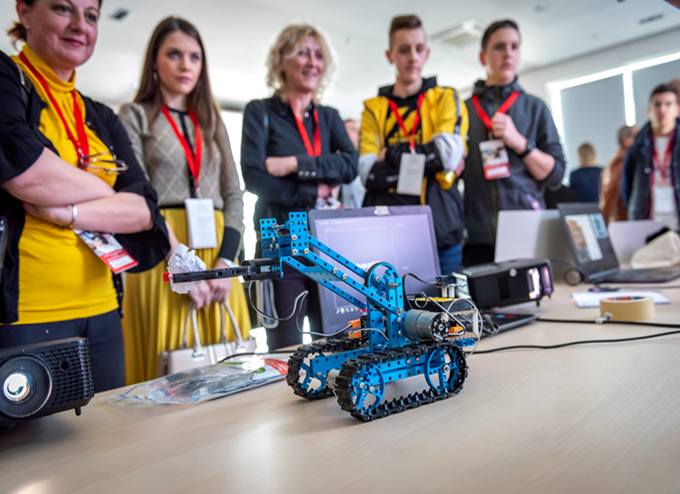Speeches Shim

USAID’s TABLA project increases teachers’ capacity to incorporate critical thinking and applied knowledge in science, technology, engineering, art, and math (STEM) in Bosnia and Herzegovina. USAID’s implementing partner for this $5.5 million, three-year project is Save the Children BiH.
Much of Europe has transitioned to a student-centered teaching method. In Bosnia and Herzegovina (BiH), however, an antiquated, mechanical classroom structure remains, with teachers reciting scripted lessons and students dutifully writing them down. Exams merely reflect how effectively they memorize the teachers’ lectures. Current and future teachers are not provided with the tools and training they need to improve their approach to classroom instruction and guide students to make decisions based on evidence. In addition, the BiH education system, like other public institutions in the country, is not immune to political capture, which diverts attention and resources away from what should be the focus: improving the quality of education. The out-of-date curricula and teaching materials prevent students from developing the critical thinking skills they need to grapple with multiple viewpoints in BiH and to assess and evaluate the large amount of information available at their fingertips.
The international community has devoted some attention to education policy, yet many of the interventions were undertaken in an ad hoc manner and were unsustainable. In some cases, international donors supported systemic reform efforts, but those ultimately lacked buy-in from local authorities.
USAID ASSISTANCE
USAID’s General Education Activity (TABLA) increases teacher capacity to incorporate critical thinking and applied knowledge in science, technology, engineering, art, and math (STEAM) and build critical competences such as Critical thinking, Creativity, Communication, and Collaboration (the ‘4Cs’) into the learning environment in BiH. Thus, TABLA expects to increase the effectiveness and efficiency of the BiH education system, develop higher quality general education learning outcomes, improve standardized testing results, and increase the skills of the workforce, resulting in a more knowledgeable, active citizenry.
IMPLEMENTATION AND EXPECTED RESULTS
Through this project, USAID expects to build teacher capacity, improve standards for pre-service and in-service teacher training, improve the learning environment in the school, and stimulate dialogue on education reform.
Interventions are coordinated and owned by relevant BiH institutions and designed to effect systemic change. Interventions are conducted in collaboration with all relevant local and international stakeholders to promote ownership of and continued support for the educational reforms at all levels. The project is implemented in three geographic areas: Sarajevo Canton and Herzegovina Neretva Canton, which are located in the Federation of BiH entity, and in the entity of Republika Srpska.
Last updated: September 15, 2021

Comment
Make a general inquiry or suggest an improvement.